|
|
|
Sort Order |
|
|
|
Items / Page
|
|
|
|
|
|
|
| Srl | Item |
| 1 |
ID:
133411
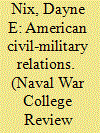

|
|
|
|
|
| Publication |
2012.
|
| Summary/Abstract |
Samuel P. Huntington died in December 2008, but this Harvard academic continues to have a significant impact on the conduct and state of American civil-military relations. Mackubin Owens's recent US Civil-Military Relations after 9/11: Renegotiating the Civil-Military Bargain and Suzanne Nielsen and Don M. Snider's 2009 edited work American Civil-Military Relations: The Soldier and the State in a New Era both challenge and contextualize Huntington's work for contemporary theorists and practitioners of civil-military relations. This is indeed a worthwhile effort, as America's civil-military relations have received much "airtime" over the past few years. General Stanley McChrystal's seeming challenge to the political leadership over proposed Afghanistan troop levels, Lieutenant Colonel Andrew Milburn's Joint Force Quarterly article challenging traditional conceptions of civilian control, and Bob Woodward's revelations in Obama's War regarding the 2009 tensions between the Pentagon and the administration over Afghanistan strategy highlight the relationship between the military and our civilian leaders while raising the issue of the military's participation in political discourse.
|
|
|
|
|
|
|
|
|
|
|
|
|
|
|
|
| 2 |
ID:
155036
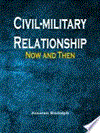

|
|
|
|
|
| Publication |
New Delhi, Alpha Editions, 2017.
|
| Description |
vii, 312p.hbk
|
| Standard Number |
9789386367525
|
|
|
|
|
|
|
|
|
|
|
|
Copies: C:1/I:0,R:0,Q:0
Circulation
| Accession# | Call# | Current Location | Status | Policy | Location |
| 059191 | 322.5/RUD 059191 | Main | On Shelf | General | |
|
|
|
|
| 3 |
ID:
121814
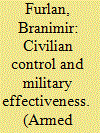

|
|
|
|
|
| Publication |
2013.
|
| Summary/Abstract |
This article gives an overview of how civilian control of the military in Slovenia is implemented in practice. It utilizes the perspective of the controlled entity itself, that is, the Slovenian Armed Forces. The findings show the type and characteristics of civilian control in Slovenia and how they hinder military effectiveness. As one of the European transition countries to have concluded the democratization of its civil-military relations, civilian control over Slovenia's Armed Forces is now in place; however, the control mechanisms have had several debilitating effects on the country's armed forces-the democratization of civil-military relations has been achieved at the partial expense of military effectiveness. Because of this experience, the Slovenian case could serve as an example of how successful democratization of civil-military relations can sometimes produce negative outcomes, or collateral damage, for the military, especially when the employers of the control mechanisms are not aware of the effects that the exercise of their control might have on the military's ability to execute core missions. Methodologically, this article brings an approach for analyzing interrelations between civilian control and military effectiveness.
|
|
|
|
|
|
|
|
|
|
|
|
|
|
|
|
| 4 |
ID:
088163
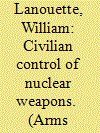

|
|
|
|
|
| Publication |
2009.
|
| Summary/Abstract |
Ever since the Manhattan Project, which built the first U.S. atomic bombs during World War II, tensions have persisted among civilian and military leaders over the control of nuclear weapons. Those tensions are highlighted anew with a proposal to move the U.S. nuclear weapons program from the Department of Energy to the Department of Defense. President Barack Obama this year asked the Office of Management and Budget to study the shift and report on the pros and cons by September. The concept has raised concern on Capitol Hill and elsewhere. Former Secretary of Energy Hazel O'Leary recently said that civilian control is good public policy and a good model for other countries to follow
|
|
|
|
|
|
|
|
|
|
|
|
|
|
|
|
| 5 |
ID:
133671
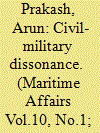

|
|
|
|
|
| Publication |
2014.
|
| Summary/Abstract |
The civil-military equation has been assigned great significance in the national security matrix, and experts consider that nations that fail to evolve a stable paradigm of civil-military relations squander their resources and run grave security risks. In India, this issue has failed to receive the importance it deserves because of the general indifference of the politicians to national security affairs on one hand, and the vested interest of the bureaucracy in maintaining the status quo on the other. It is believed that civil-military relations constitute a zero-sum game in which "civilian control" is retained by reducing the power of the military vis-à-vis the civilians. An irrational but subliminal fear of the military has led the Indian politicians to skew the civil-military equation in favour of the bureaucracy and, in a paradigm unique to India, to place the military under their control. Pointing to the military's sense of grievance and the vitiated atmosphere that prevails in the Ministry of Defence, the author reflects on the price being paid by the nation for endemic "civil-military dissonance" in terms of major national-security shortcomings, as well as the damage being inflicted on the institution of our armed forces.
|
|
|
|
|
|
|
|
|
|
|
|
|
|
|
|
| 6 |
ID:
129603
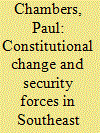

|
|
|
|
|
| Publication |
2014.
|
| Summary/Abstract |
Achieving civilian control of security forces through constitutional reform processes has been a major challenge for young democracies or democratizing countries in Southeast Asia. In many cases, governments seeking to establish or consolidate civilian control have been faced with coups d'état or the threat of coups. The successful enshrinement of laws reining in security force adventurism has often accompanied compromises which at most provide militaries with considerable latitude in their areas of decision-making or at least protect soldiers from judicial prosecution. Ultimately, the constitutional incorporation of security forces into embedded political life is no easy task. This article examines two country cases of "defective" democracies. In each case, security forces have moved towards becoming more integrated under the constitutions of civilian-led regimes. This study poses four questions. First, how did the institutionalization of security forces under civilian-led constitutions occur? Second, how did these experiences vary? Third, to what extent do these security forces today possess differing degrees of enshrined powers? And fourth, based upon these experiences, how might civilian control be sustained over time? The article argues that constitutional change acceded to by security forces more often than concessions by civilians. However, the initial bargain can later transform itself towards more or less security force interventionism depending upon three variables: the heritage of authoritarianism; the relative unity of civilians as opposed to the security forces; and threat environments.
|
|
|
|
|
|
|
|
|
|
|
|
|
|
|
|
| 7 |
ID:
178346


|
|
|
|
|
| Summary/Abstract |
Peacekeeping has widely been seen as conducive to submit the military to democratic rule. We put the assumption to an empirical test based on the case of Uruguay, today a fully democratic state that has consistently ranked among the world’s top peacekeeping contributors per capita. Specifically, we ask whether participation in peacekeeping has increased civilian control over the military. To answer this question, we focus on three aspects of democratic civil–military relations: civilian oversight, civilian policy management, and armed forces–society relations. We conclude that peacekeeping has done little to trigger greater involvement of civilians in the area of military and defense policy but that it contributed to reduce the gap between the armed forces and society. Nevertheless, due to political neglect by civilian authorities, the state of civil–military relations is one of subordinate military autonomy short of ideal, even if it does not represent a threat to democratic rule.
|
|
|
|
|
|
|
|
|
|
|
|
|
|
|
|
| 8 |
ID:
098466
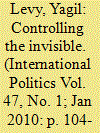

|
|
|
|
|
| Publication |
2010.
|
| Summary/Abstract |
Militaries work intentionally, visibly and in a politically controlled manner to fulfill their formal assignments as the professional perpetrators of external violence on behalf of the state. It is to this level of military action that the existing literature on the civilian control of the military is confined. However, through the intensive interaction between the military and civilians, the effects of formally controlled military activity go beyond the professional domain and are felt in civilian areas, where, in the long term, military activity helps create structures of unequal power relations. Given its structural dimension, this aspect of the military is not necessarily or immediately visible to the main agents involved; hence, it is divorced from effective civilian control. I conceptualize this neglected type of control as effectual control, distinct from the theoretically well-established notion of operational control. This paper theorizes the essence of effectual control.
|
|
|
|
|
|
|
|
|
|
|
|
|
|
|
|
| 9 |
ID:
120315
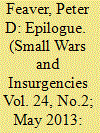

|
|
|
|
|
| Publication |
2013.
|
| Summary/Abstract |
The field has traditionally studied civil-military relations in one of two domains: supreme command, where the great questions of war and peace were decided by the top leaders, or society, where the military institutions sought to establish themselves in relations to the broader civilian world. This special edition emphasizes a third domain: the modern battlefield of complex operations. In that setting the lines between civilian and military are even more blurred than in traditional settings (where they were already quite blurred), and concerns about effectiveness cannot be ignored for the sake of the traditional focus on control.
|
|
|
|
|
|
|
|
|
|
|
|
|
|
|
|
| 10 |
ID:
183896
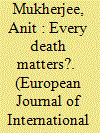

|
|
|
|
|
| Summary/Abstract |
How do combat missions, defined as an armed confrontation that causes casualties, shape civil-military relations and military’s role conception? This article argues that militaries that incur combat casualties gain a stronger hand in the civil-military equilibrium. This is because casualties affect domestic political opinion and give prominence to the views expressed by military officials. Civilians are then more deferential to professional military advice. In turn, the military obtains considerable operational freedom, and can pick and choose missions which they find desirable. Second, the military’s role conception – an important determinant of military missions, is shaped most prominently by its combat experience. Militaries sustaining casualties obtain leverage vis-à-vis civilians and based on their institutional preference, they either prioritise or avoid non-traditional missions. While making these arguments, this article examines combat casualties, role conception, and civilian control in India. These concepts as a whole and, the Indian case study especially are surprisingly understudied considering it is among the few non-Western democracies with firm civilian control, a record of overseas intervention operations and a military with varying roles and missions. Analysing India’s experience therefore adds to the literature and illuminates the mechanism through which casualties affect civil-military relations.
|
|
|
|
|
|
|
|
|
|
|
|
|
|
|
|
| 11 |
ID:
188246
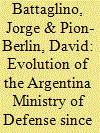

|
|
|
|
|
| Summary/Abstract |
Through a progressive strengthening of organizational, legal, and personnel attributes, Argentina's Ministry of Defense has become civilianized. The MOD has been strengthened by the addition of new bureaucratic units headed by civilians with the authority to shape and conduct defense policy while also encouraging interactions with military personnel, resulting in better informed policy choices. This article will account for these changes through a detailed analysis of foreign affairs, strategic planning and promotions, production and research, and education. Procedural rules, divisions of labor and civil-military interactions are delineated. Military modernization deficiencies and the need for a permanent civilian staff are noted.
|
|
|
|
|
|
|
|
|
|
|
|
|
|
|
|
| 12 |
ID:
173349
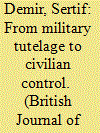

|
|
|
|
|
| Summary/Abstract |
The Turkish Armed Forces (TAF) have been the main discussion topic in the political arena over the last decade in Turkey, with a focus on curtailing military supervision over political life. This article investigates the evolution of civil–military relations (CMR) in Turkey. Thus, the aim of this study is to explore the factors and dynamics that have led to the development and realignment of CMR in Turkey. The focus will be on how military tutelage in Turkey has been ended, what factors have caused this and finally whether Turkish CMR have been normalized.
|
|
|
|
|
|
|
|
|
|
|
|
|
|
|
|
| 13 |
ID:
188248
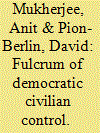

|
|
|
|
|
| Summary/Abstract |
In this introduction we present the justification and the analytical frame of our special issue. More specifically, this issue examines the institutional role of defence ministries in fortifying civilian control and military effectiveness. As we argue, scholarship on this subject is sparse, despite the ministry’s importance in enforcing civilian control, enhancing military effectiveness, and conducting the day-to-day affairs of national defense. If defence ministries are to fulfill these obligations, they must be properly positioned, financially and bureaucratically endowed, as well as staffed with knowledgeable civilians with sufficient authority. Not all ministries are up to these standards. To highlight these aspects, our special issue examines the defense ministries of four countries, two of which are older democracies (France and India) and two more recently established ones (Argentina and South Korea). These case studies pay particular attention to organizational design of the ministries, the roles assigned to civilian and military personnel, how much defense expertise civilians and officers can claim, and whether there are mechanisms that allow ministry personnel to convert resources into military strength. We underscore our contribution to the literature and suggest avenues for further research.
|
|
|
|
|
|
|
|
|
|
|
|
|
|
|
|
| 14 |
ID:
156641
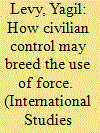

|
|
|
|
|
| Summary/Abstract |
This article is about a puzzle: strong civilian control of the military may promote the use of force not lessen it. Existing theories about civil–military relations and militarism do not adequately resolve this puzzle because they neglect the link between civilian control and the legitimacy to use force. The argument here is that an increase in the civilian control of the military may promote the use of force by legitimizing it under specific cumulative conditions: the existence of a previous militaristic infrastructure in the civilian political culture, which is triggered by an external event, and is augmented by three mechanisms deriving from civilian control that increase the legitimacy of using force by reducing deliberative decision-making. These three mechanisms are: (1) the depoliticization of the military caused by reinforcing civilian control, so the professional opinion of the military reigns supreme; (2) the militarization by inflating threats and setting ambitious war goals to remove such threats, which balances out the aversion to sacrifice for war that civilian control produces; and (3) the transition produced by civilian control to a volunteer, technology-intensive, downsized military that reduces the stake of citizens in military policies. The plausibility of this argument is explored by reference to the cases of the United States, Israel, and Russia.
|
|
|
|
|
|
|
|
|
|
|
|
|
|
|
|
| 15 |
ID:
106434
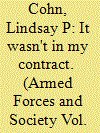

|
|
|
|
|
| Publication |
2011.
|
| Summary/Abstract |
An increase in the use of private military and security contractors over the last two decades has sparked a debate over whether their employment enhances or detracts from government control of its security agents. Although there is a rich literature on civilian control of military agents, there is still disagreement on the operationalization of control, and there has been little attempt to apply these theories to private actors. This article contributes to both discussions by offering a synthesis of theories of control and comparing features specific to public versus private agents that may affect control. The author offers the hypothesis that the principles of democratic governance are likely to be more secure when policy is carried out by public agents.
|
|
|
|
|
|
|
|
|
|
|
|
|
|
|
|
| 16 |
ID:
187109
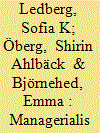

|
|
|
|
|
| Summary/Abstract |
This article analyzes civil–military relations and the issue of civilian control through the lens of new managerialism. It illustrates that the means and mechanisms applied by governments to govern the military actually shape its organization and affect its functions in ways not always acknowledged in the civil–military debate. We start by illustrating the gradual introduction of management reforms to the Swedish Armed Forces and the growing focus on audit and evaluation. The article thereafter analyzes the consequences of these managerialist trends for the most central installation of the armed forces–its headquarters. It further exemplifies how such trends affect the work of professionals at the military units. In conclusion, managerialist reforms have not only changed the structure of the organization and the relationship between core and support functions but have also placed limits on the influence of professional judgment.
|
|
|
|
|
|
|
|
|
|
|
|
|
|
|
|
| 17 |
ID:
130229
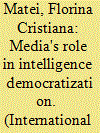

|
|
|
|
|
| Publication |
2014.
|
| Summary/Abstract |
In their path toward democratic consolidation, emerging democracies endeavor to ensure the democratic transfer of political power, bring changes in the legal framework, transform their executive, legislative, and judicial systems, boost free market economy, and develop robust and functional civil societies. They also institutionalize democratic civil-military relations (CMR) by establishing new security institutions-military, police, and intelligence agencies-that are under democratic civilian control, effective, and efficient. Of these many tasks, the democratization of intelligence agencies is by far the most daunting, as effectiveness and efficiency involve secrecy, while democratic control implies transparency, openness, and accountability. Nevertheless, democratic reform of intelligence in new democracies, though difficult, is not impossible, if and when civilians are interested and willing to "invest" in intelligence and intelligence reform. The contribution of external factors, such as media, 2 civil society, international groups, and individuals involved in human rights, may also be instrumental in achieving a balance between control and effectiveness of intelligence
|
|
|
|
|
|
|
|
|
|
|
|
|
|
|
|
| 18 |
ID:
188247
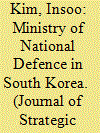

|
|
|
|
|
| Summary/Abstract |
South Korea’s transition from military-controlled authoritarianism to consolidated civilian-dominated democracy is widely considered a success story. However, civilians’ roles within the MND remain severely limited due to the institutional design of the MND. A decentralised structure emerged in the MND, delegating policy decision-making in critical areas to professional soldiers. Data analysis on 1,060 employees in 21 MND departments shows a clear cut between the military domain and the civilian domain within the MND, which enabled the military to thwart 30 years of civilian efforts to reform the military structure without challenging the principle of civilian supremacy.
|
|
|
|
|
|
|
|
|
|
|
|
|
|
|
|
| 19 |
ID:
134173
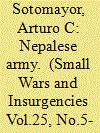

|
|
|
|
|
| Publication |
2014.
|
| Summary/Abstract |
Can peacekeeping participation help reform military institutions in democratizing states? Drawing on evidence from Nepal - one of the world's largest troop contributors to UN peacekeeping operations - this essay illustrates that participation in peace missions can sometimes undermine security sector reform and deteriorate civil-military relations. Furthermore, this analysis shows that peacekeeping participation will not necessarily reorient troops away from their conventional internal roles (such as counterinsurgency) or improve civilian control over the armed forces. Hence, civilians can lose control over soldiers just as frequently when they are deployed overseas as when they are at home.
|
|
|
|
|
|
|
|
|
|
|
|
|
|
|
|
| 20 |
ID:
145620


|
|
|
|
|
| Summary/Abstract |
Military influence on political life in Turkey is a widely known phenomenon in civil-military relations (CMRs) literature, and there are multiple studies reviewing Turkish military tutelage and its roots in the light of the theories developed in this field. However, dynamics of the increasing civilian control over the armed forces in the last decade still serves as a field for further studies. As put forward in CMRs theories, civilian control can be established and maintained through formal arrangements and informal practices. The source of power required to make changes in CMRs is also emphasized along with these control mechanisms. Following the coup in 1980, limited demilitarization process in Turkey was carried out partly with the help of the civilian leaders' personalities and partly with the support of the European Union membership procedures, which has been ineffective since 2005. How civilianization was accomplished since then still needs to be clarified. This article aims to explain the factor(s) that enabled the civilians to gain full control over the armed forces in this period. As a result, the role of popular support is identified as the leading factor for designing formal and informal mechanisms to control the military in Turkey since 2007.
|
|
|
|
|
|
|
|
|
|
|
|
|
|
|
|
|
|
|
|
|